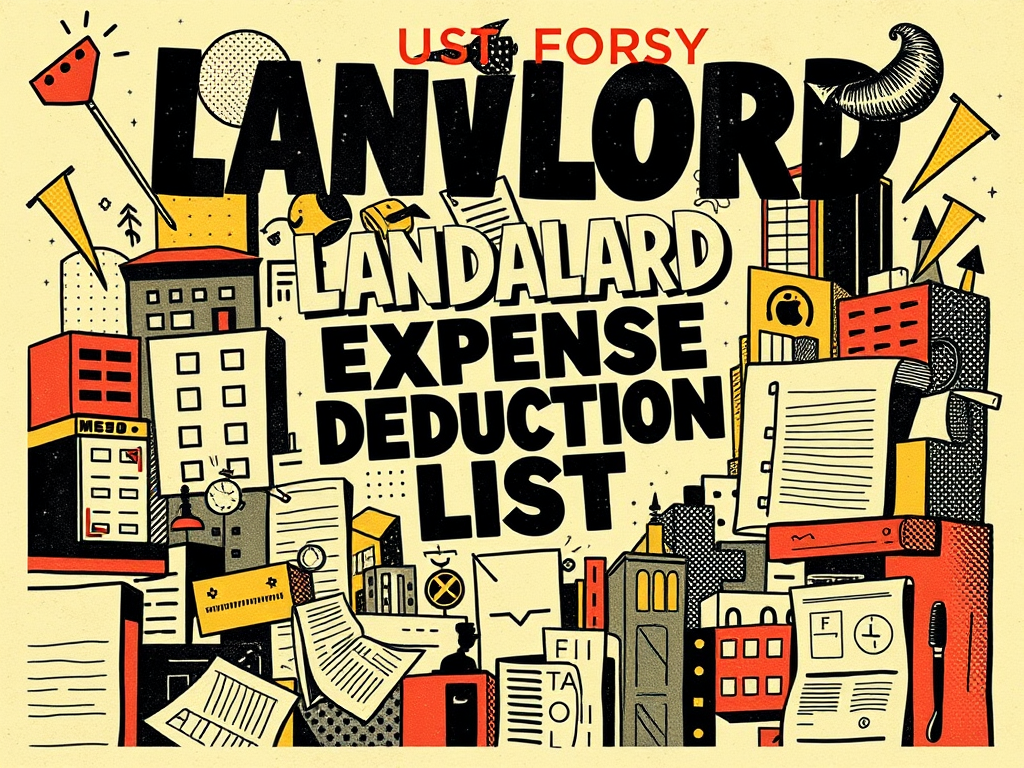
Deductions for Landlords: Expenses You Can Offset Against Rental Income
Reading time: 15 minutes
Table of Contents
- Introduction
- Understanding Rental Income
- Common Deductible Expenses for Landlords
- Mortgage Interest and Property Taxes
- Repairs and Maintenance
- Depreciation
- Insurance Premiums
- Professional Services
- Travel Expenses
- Home Office Deduction
- Advertising and Marketing Costs
- Utilities and Services
- Special Considerations for Short-Term Rentals
- Record-Keeping Best Practices
- Tax Planning Strategies for Landlords
- Conclusion
- FAQs
1. Introduction
As a landlord, understanding the deductions you can claim against your rental income is crucial for maximizing your property investment returns. The intricate landscape of tax deductions for rental property owners offers numerous opportunities to reduce your taxable income, but it also requires careful navigation and meticulous record-keeping. This comprehensive guide will delve into the various expenses landlords can offset against their rental income, providing you with the knowledge to optimize your tax strategy and enhance your overall financial performance in the real estate market.
2. Understanding Rental Income
Before we explore deductions, it’s essential to have a clear understanding of what constitutes rental income. Rental income typically includes:
- Regular rent payments from tenants
- Advance rent payments
- Security deposits that are not returned to tenants
- Fees for canceling a lease
- Tenant-paid expenses (e.g., property taxes or utilities)
It’s important to note that rental income is generally reported on Schedule E of your tax return. This form is where you’ll also list your deductible expenses, which we’ll cover in detail throughout this article.
3. Common Deductible Expenses for Landlords
Landlords can deduct a wide range of expenses related to owning, maintaining, and managing rental properties. These deductions can significantly reduce your taxable rental income. Let’s explore some of the most common and valuable deductions available to landlords.
4. Mortgage Interest and Property Taxes
One of the largest deductions for many landlords is mortgage interest. If you have a mortgage on your rental property, you can deduct the interest paid on that loan. This deduction applies to both primary mortgages and home equity loans or lines of credit used for the rental property.
Property taxes are another substantial deduction. You can deduct the full amount of property taxes paid on your rental property. It’s important to note that recent tax law changes have placed limits on the deductibility of state and local taxes (SALT) for personal residences, but these limits do not apply to taxes paid on rental properties.
5. Repairs and Maintenance
Costs associated with keeping your rental property in good condition are generally deductible. This includes:
- Fixing leaks or plumbing issues
- Repairing electrical systems
- Painting
- Replacing broken windows or doors
- Maintaining appliances
It’s crucial to distinguish between repairs and improvements. While repairs are fully deductible in the year they’re made, improvements that add value to the property or extend its life must be capitalized and depreciated over time.
6. Depreciation
Depreciation is a valuable tax deduction that allows you to recover the cost of your rental property over time. The IRS considers residential rental properties to have a useful life of 27.5 years. Each year, you can deduct a portion of the property’s value as depreciation expense.
To calculate depreciation:
- Determine the property’s cost basis (purchase price plus certain closing costs and improvements)
- Subtract the value of the land (which is not depreciable)
- Divide the remaining amount by 27.5
This annual depreciation deduction can significantly reduce your taxable rental income.
7. Insurance Premiums
Landlords can deduct the premiums paid for insurance policies related to their rental properties. This includes:
- Property insurance
- Flood insurance
- Liability insurance
- Landlord insurance
If you have a mortgage, your lender likely requires you to maintain property insurance. These premiums are fully deductible as a rental expense.
8. Professional Services
Fees paid for professional services related to your rental property are deductible. This can include:
- Legal fees for lease agreements or evictions
- Accounting services for bookkeeping and tax preparation
- Property management fees
- Real estate agent commissions for finding tenants
Keep detailed records of these expenses, as they can add up to a significant deduction over the course of a year.
9. Travel Expenses
If you travel to your rental property for management or maintenance purposes, you may be able to deduct these expenses. This includes:
- Mileage or actual vehicle expenses
- Airfare and lodging for long-distance property management
- Meals (subject to 50% limitation)
To claim these deductions, it’s essential to keep meticulous records of your travel, including the purpose of each trip and the expenses incurred.
10. Home Office Deduction
If you use a portion of your home exclusively for managing your rental properties, you may be eligible for the home office deduction. This can include a percentage of your mortgage interest, property taxes, utilities, and insurance based on the square footage used for your rental business.
To qualify, the space must be used regularly and exclusively for your rental property management activities. This deduction can be valuable, but it’s important to be prepared to substantiate your claim if audited.
11. Advertising and Marketing Costs
Expenses related to advertising your rental property and finding tenants are fully deductible. This can include:
- Online listing fees
- Print advertisements
- Signage
- Marketing materials
Keep receipts and records of all advertising expenses to ensure you can claim the full deduction.
12. Utilities and Services
If you pay for any utilities or services for your rental property, these costs are deductible. This may include:
- Electricity, gas, and water
- Trash collection
- Internet and cable TV
- Lawn care or snow removal services
In cases where tenants reimburse you for these expenses, you would report the reimbursement as income and then deduct the full cost as an expense.
13. Special Considerations for Short-Term Rentals
The rise of platforms like Airbnb and VRBO has led to an increase in short-term rental properties. These properties may have additional deductible expenses, such as:
- Cleaning fees between guests
- Consumables (e.g., toiletries, coffee, welcome baskets)
- Platform fees and commissions
- Additional wear and tear on furnishings
However, short-term rentals may also face different tax treatment depending on how often the property is rented and used personally. It’s crucial to understand the specific rules that apply to your situation.
14. Record-Keeping Best Practices
Proper record-keeping is essential for maximizing your deductions and protecting yourself in case of an audit. Consider the following best practices:
- Use a dedicated bank account and credit card for rental property expenses
- Keep digital copies of all receipts and invoices
- Use property management software to track income and expenses
- Maintain a mileage log for property-related travel
- Document the purpose of each expense
By implementing these practices, you’ll be well-prepared to claim all eligible deductions and support your claims if questioned by tax authorities.
15. Tax Planning Strategies for Landlords
To maximize your tax benefits as a landlord, consider the following strategies:
- Time major repairs and improvements strategically to optimize deductions
- Consider cost segregation studies to accelerate depreciation
- Explore the benefits of setting up a business entity for your rental activities
- Stay informed about tax law changes that may affect rental property owners
- Consult with a tax professional who specializes in real estate investments
By taking a proactive approach to tax planning, you can significantly reduce your tax liability and improve the overall return on your rental property investments.
16. Conclusion
Understanding and properly claiming deductions for your rental property expenses is crucial for maximizing your investment returns. From mortgage interest and property taxes to repairs, depreciation, and professional services, there are numerous opportunities to reduce your taxable rental income. By keeping meticulous records and staying informed about tax laws, you can ensure that you’re taking full advantage of the deductions available to landlords.
Remember that tax laws can be complex and subject to change. While this guide provides a comprehensive overview of deductions for landlords, it’s always advisable to consult with a qualified tax professional for personalized advice tailored to your specific situation. With careful planning and proper documentation, you can optimize your tax strategy and enhance the profitability of your rental property investments.
For those looking to expand their real estate portfolio, consider exploring opportunities to buy home in greece, where favorable tax conditions and a growing rental market can offer attractive investment prospects.
FAQs
-
Q: Can I deduct the cost of improvements made to my rental property?
A: While repairs are fully deductible in the year they’re made, improvements that add value to the property or extend its life must be capitalized and depreciated over time. For example, replacing a broken window is a repair, but adding a new room is an improvement that must be depreciated.
-
Q: How long do I need to keep records of my rental property expenses?
A: The IRS recommends keeping records for at least three years from the date you file your tax return. However, for property-related expenses and improvements, it’s wise to keep records for as long as you own the property, plus an additional three years after you sell it.
-
Q: Can I deduct losses from my rental property against my other income?
A: Rental property losses are generally considered passive losses and can only offset passive income. However, if you actively participate in the rental activity and your modified adjusted gross income is below $100,000, you may be able to deduct up to $25,000 of rental losses against your other income.
-
Q: Are property management fees tax-deductible?
A: Yes, fees paid to a property management company for services related to your rental property are fully deductible as a rental expense. This includes costs for finding tenants, collecting rent, and overseeing property maintenance.
-
Q: Can I deduct the cost of traveling to check on my rental property?
A: Yes, travel expenses related to managing, maintaining, or repairing your rental property are deductible. This includes mileage or actual vehicle expenses, airfare, lodging, and 50% of meal costs. However, it’s crucial to keep detailed records of the purpose and expenses of each trip to substantiate your deductions.

Article reviewed by Ariana Smit, Investment Portfolio Manager | Real Estate & Private Equity Expert | Driving High-Yield Investments, on March 23, 2025






